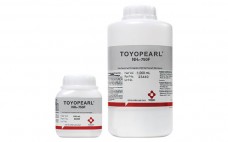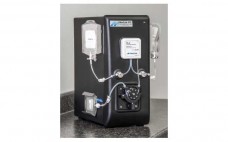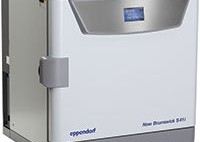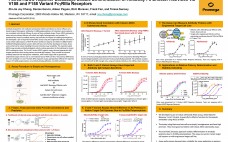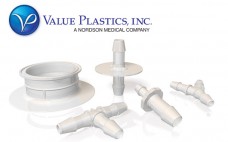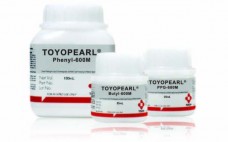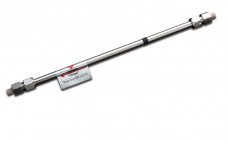The drive to reduce the manufacturing costs for biological therapeutics have increased the demands placed on downstream unit operations to the point where a single processing step is expected to accomplish a multitude of purification objectives. Where anion exchange resins have traditionally been used to remove DNA, endotoxin, and as a viral clearance step in the purification of monoclonal antibodies (mAbs), new ligand chemistries make it possible for anion exchange chromatography to do more. In the following paper, TOYOPEARL NH2-750F,…
Sponsored Content
Flow Electroporation for Vaccine Development and Production: From Subunit Vaccines to Ex Vivo Immunotherapy
MaxCyte flow electroporation is a universal, clinically validated transient transfection platform for rapid, high-quality cell transfection in the development and production of vaccines and cellular immunotherapies.
One Billion Mesenchymal Stem Cells in Eppendorf BioBLU 5c Single-Use Bioreactor at 3L Scale
This webcast features: Ma Sha This Ask the Expert webcast features Dr. Ma Sha, Director of Technical Applications for Eppendorf, Inc. In this webcast, presented to a live audience on May 6, 2014, he demonstrated the success of large clinical-scale culture of human adipose-derived mesenchymal stem cells (AdMSCs) in a BioBLU 5c single-use bioreactor at 3L scale. You can view the webcast here (Registration Required) Link to paper mentioned in presentation: A Novel Method for the Expansion of Mesenchymal Stem…
Paired ADCC Reporter Bioassays Enable Differentiation of Antibody Fc Effector Activities via V158 and F158 Variant FcyRIIIa Receptors
Antibody-dependent cell-mediated cytotoxicity (ADCC) contributes to clinical efficacy of a broad range of therapeutic antibodies. FcÎłRIIIa polymorphism of individual cancer patients are correlated with clinical efficacy of some of these antibody drugs. Classic ADCC cytotoxicity assays rely on primary effector cells, which are highly heterogeneous and variable. To quantitatively measure antibody activity and evaluate the impact of FcÎłRIIIa polymorphism, we developed a pair of reporter-based ADCC assays using two engineered effector cell lines in Jurkat that stably express an NFAT-RE driven…
KrosFlo® Research IIi Tangential Flow Filtration System
Spectrum Laboratories’s the KrosFlo ®Research IIi Tangential Flow Filtration System (KRIIi) is the only commercially available system with hold up volumes as low as 1 milliliter. Spectrum’s innovative, semi-automated TFF System, is ideal for small volume, R&D scale microfiltration and ultrafiltration. The KRIIi system can be used to concentrate and wash, viruses, proteins, nano-particles, and cells, at low volumes, with remarkable recovery rates. Hollow Fiber Tangential Flow Filtration is fast becoming the preferred method of large and small scale processing, due to outstanding efficiency and easy scalability compared to cassette or centrifugal devices.
TOYOPEARL GigaCap® DEAE-650M Preserving Resolution at Increased Protein loads
TOYOPEARL GigaCap DEAE-650M is an ideal anion exchange resin for the chromatographic purification of biotherapeutic products. Since the TOYOPEARL GigaCap DEAE-650M has such a high dynamic binding capacity, the need for very large columns and massive buffer consumption is minimized, particularly for proteins expressed at higher levels due to upstream improvements.
The Importance of a One-Stop-Shop-6 Questions to Ask Your Fluid Management Component Supplier
A one-stop-shop fluid management component supplier assures quality, streamlines processes, and limits costs. To be certain you receive the preeminent and safest single-use component, take time to evaluate your fluid-management supplier or a supplier under consideration by asking the 6 important questions we pose in this whitepaper. Your supplier’s answers will help determine if the company is a steadfast partner and one-stop-shop committed to helping you pass FDA validation. You also will learn your supplier’s willingness to provide: the best…
A versatile high capacity, single-use chromatography tool with superior salt tolerance, process robustness and impurity removal
Strong anion exchange (Q) chromatography has become an industry standard in the polish purification steps of mAb production. It is a proven technology to remove DNA, viruses, endotoxins and acidic host cell proteins from process feed streams in flowthrough mode. As the industry pursues an increasing interest in downstream single-use technologies and flexible biomanufacturing due to advancements in cell culture technology and the emergence of cost-sensitive biosimilars, conventional purification technologies present limitations. Despite their high binding capacity, traditional resin-based chromatography…
Hydrophobic Interaction Chromatography: Effects of Mixed Electrolytes on Protein Separations
For HIC separations, parameters other than resin surface modifications can be employed to enhance performance. This application note addresses the electrolyte composition of the mobile phase as one parameter responsible for protein adsorption and desorption. The results presented illustrate the benefits regarding capacity and selectivity in HIC of often neglected salts and their mixtures.
Separation of Monoclonal Antibody (mAb) Monomer from its Half-body using Size Exclusion Chromatography
Recent research has shown an interest in mAb half-bodies as therapeutic vectors as they can be further targeted for conjugation, enzyme labeling, or antibody immobilization. The TSKgel SuperSW mAb HR is able to achieve high resolution between the mAb monomer, the mAb half-body, and fragments due to its unique pore-controlled technology optimized for mAb analysis, as well as its smaller 4 ÎĽm particle size.

